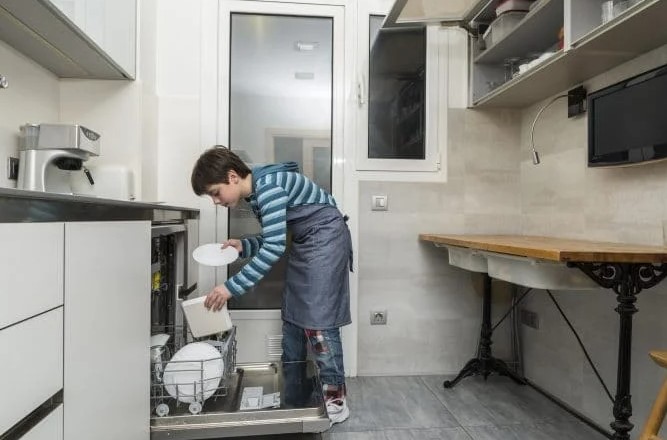In today’s world, many parents wonder about the right balance between fun and responsibility for their children. Do you give your kids chores? Are they reluctant to help, or perhaps complain during the process? Despite the grumbling, you’re actually doing the right thing. Kids today need more responsibility, not less. With the world becoming increasingly focused on entertainment and play, it’s crucial for children to learn how to take responsibility from an early age.
Consider this: the average child now spends six hours a day in front of screens, whether watching TV or playing on a digital device. This has created a generation of kids who see life as something to be enjoyed and filled with endless play. While play is important and beneficial for both children and adults, it’s crucial that we strike a balance. As a society, we’ve started to place more emphasis on play and freedom, at the expense of teaching children to handle responsibilities.
In contrast, previous generations had a different approach. They still had time for play, but there was a strong focus on imparting responsibilities. Kids were expected to contribute to family life, often through chores and tasks that taught them the value of hard work and independence. They were seen as future adults who needed to understand how to manage life, not as perpetual children.
So, what should we be doing to prepare our children for the challenges of adulthood? The answer is simple: Give them more responsibility.
The Importance of Responsibility in Child Development
Teaching kids responsibility isn’t about overwhelming them or making them feel burdened at a young age. Instead, it’s about equipping them with the skills they’ll need to thrive as adults. It’s about teaching them that life is not only about enjoyment but also about contributing to the family, the community, and eventually, society at large. When children understand the value of responsibility, they develop essential life skills, such as time management, problem-solving, and self-sufficiency. These are qualities that will serve them well as they grow older.
But how can you, as a parent, begin to instill this sense of responsibility in your children without making it feel like a punishment? The key is to start small and make it a gradual process.
Starting with Small Chores: A Gradual Approach
As with any new skill, teaching responsibility to kids must be done in manageable steps. Don’t expect your child to take on major household tasks right away. Begin with simple chores that they can handle. Perhaps they can start by picking up their toys or making their bed. As they master these small tasks, you can gradually introduce more responsibilities.
For instance, once they’ve learned to clean up their toys, encourage them to help put away their clothes, set the table, or even help with simple cooking tasks. Over time, they’ll become more confident in their ability to take care of themselves and their environment. By taking gradual steps, you allow them to build their self-esteem and develop their problem-solving abilities, rather than feeling overwhelmed by a mountain of tasks.
Why Responsibility Matters for Their Future
You may wonder, why is it so important for kids to take on more responsibility? The answer lies in the fact that life as an adult can be challenging, and those who grow up without learning to take care of themselves often struggle when they face real-world situations. For instance, if kids don’t learn how to cook, clean, or manage their time as they grow older, they may find themselves unprepared when it’s time to live on their own. They might struggle with everyday tasks or even find it difficult to manage responsibilities like finding a job or paying bills.
Additionally, kids who learn responsibility are more likely to develop strong work ethics and a sense of independence. They will feel a greater sense of ownership over their lives, which translates into higher self-esteem and confidence. These qualities are essential for success in adulthood.
The Balance Between Fun and Responsibility
While it’s important for kids to learn responsibility, that doesn’t mean that playtime should be eliminated. Children need time to relax, have fun, and engage in creative play. Play is crucial for cognitive development, emotional expression, and social skills. But it should not be the sole focus of their lives.
In the past, children were expected to balance both fun and responsibility. They learned to complete chores, help with family tasks, and take pride in their contributions. At the same time, they had plenty of time for play and enjoyment. This balance is key to developing well-rounded individuals who are capable of thriving in both their personal and professional lives.
Chores as a Tool for Teaching Life Skills
Introducing chores into your child’s routine isn’t just about getting them to clean up after themselves. It’s about teaching them important life skills, such as time management, organization, and teamwork. Chores also teach them the value of contributing to a collective effort, whether it’s helping with household duties or assisting a sibling with their tasks. These skills will serve them well as they grow older and begin to navigate the responsibilities of adulthood.
How to Make Responsibility Fun
One of the challenges many parents face is getting their children to enjoy doing chores. It’s true that chores can feel like a drag, but they don’t have to be boring. Try to make the process fun and engaging. For example, you can turn a cleaning task into a game or challenge them to beat the clock and finish the task in a set amount of time. You can also praise their efforts and celebrate their achievements, which will help them feel good about their contributions.
When children are involved in the decision-making process about which chores they’d like to take on, they feel a greater sense of ownership and pride. Allowing them to have a say in their responsibilities empowers them to take initiative and gives them a sense of control over their own lives.
The Long-Term Impact of Responsibility
As your children grow and take on more responsibilities, you’ll notice a shift in their behavior. They will become more confident in their abilities and more willing to tackle challenges. They will also begin to understand that their actions have consequences, which is an essential lesson for adulthood.
In the long run, giving your children more responsibility will help them become more self-sufficient and resilient individuals. They will be better equipped to handle the demands of adult life, from managing finances to maintaining healthy relationships. They’ll also have a greater sense of empathy and community, as they’ve been taught the importance of contributing to the greater good.
Conclusion: Building a Better Future for Our Kids
The future of our children depends on the lessons we teach them today. By giving them more responsibility, we’re not only preparing them for the practical demands of adulthood but also helping them develop the character traits they’ll need to succeed in life. Responsibility fosters independence, confidence, and work ethic—all qualities that will enable them to thrive in an increasingly complex world.
While playtime and enjoyment are still important, teaching kids how to take responsibility is essential for their growth and success. By starting small and gradually increasing their responsibilities, we can raise a generation of young people who are capable, compassionate, and ready to face the challenges of the future. In the end, your efforts will pay off, as your kids will thank you for preparing them to become responsible, capable adults.










